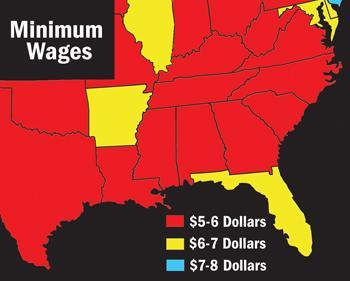The $2.10 minimum wage increase proposed in the U.S. House of Representatives passed in the U.S. Senate on Feb. 1, but debates over its effect on the economy are still raging.
The minimum wage has not been increased in 10 years, and inflation has reduced its current value to the lowest in 50 years according to a Jan. 12 report by The Washington Post.
There are several arguments rising as to what a government mandated wage increase could do to economic growth.
Some think the increase will cause businesses to cut jobs. Robert Newman, University chairman for the Department of Economics, said, “Raising the price of any input causes firms to use less of that input. Firms can adjust to the higher cost of doing business by either reducing the number of low-skilled workers they use, reducing the number of hours they work, reducing fringe benefits, changing job descriptions, or some combination of these adjustments. Either way, the effects on the low-skilled workforce is negative.”
Minimum wage increase advocates argue businesses already operate at their most efficient levels even at the current wage of $5.15.
“If you buy that argument, you would have to buy the argument that employers hire people just to hire them. Businesses hire because of their needs and the ability of those people to contribute to their profits. They won’t hire five people if they need four or hire four if they need five. They hire the number of people necessary to make their business profitable,” said Louis Reine, president of the Louisiana chapter of the American Federation of Labor and Congress of Industrial Organizations.
Some argue the increase will only benefit a small number of Americans. Ed Pratt, press secretary for the Department of Labor told The Daily Reveille about 42,000 workers are at or below below minimum wage, about 2.3 percent of the work force.
“Only one in five workers earning the federal minimum wage live in families with household earning below the poverty level. Most of those earning the minimum wage are not poor,” Newman said, “Sixty percent of them work part-time and their average household income is well over $40,000.”
He also said that if Congress raises the cost of low-skill workers, less than 20 percent will go to families under the poverty level, while more than half of the increase will go to households well above the poverty threshold.
Reine responded by saying, “If it’s my household making minimum wage, it’s 100 percent to me. What your neighbor makes doesn’t put food on your table. At your house you either are, or you aren’t. And a family’s children don’t eat based on what 98 percent of the workforce makes.”
Newman said that a large number of those people earning minimum wage are young adults, and a higher minimum wage may present an unforeseen problem.
“One recent study found that raising the minimum wage makes work more attractive relative to school for many teenagers, which raises the dropout rate,” he said.
Some students have had dissenting opinions on the potential wage increase. Mary Ellen Bourgeois, advertising junior, said she is optimistic about increased wages.
“People point fingers at those that don’t properly support their families, but sometimes they are working harder than those that are making all the money,” Bourgeois said.
As the bill goes to a final joint committee for approval many questions are left unanswered, and the nation must simply wait and see.
Peter Weirs, International studies graduate student said he is skeptical of the increase’s effectiveness and “doubts it will provide any practical benefit to people working for minimum wage, or any detriment to employers who pay it. It’s not going to make much difference either way.”
—–Contact Jimmy Garrett at jgarrett@lsureveille.com
Debate continues over potential wage increase
February 16, 2007




